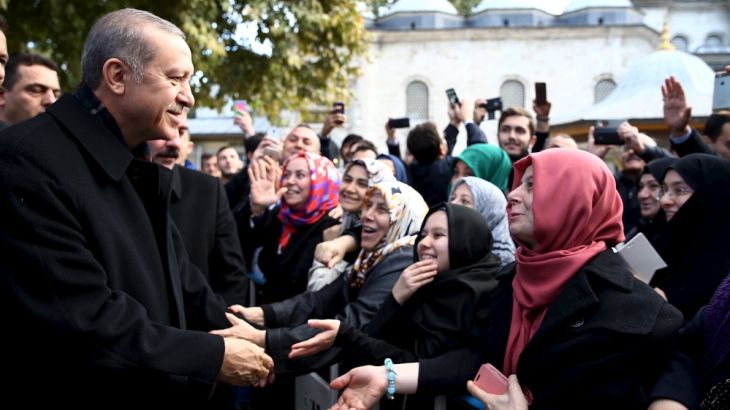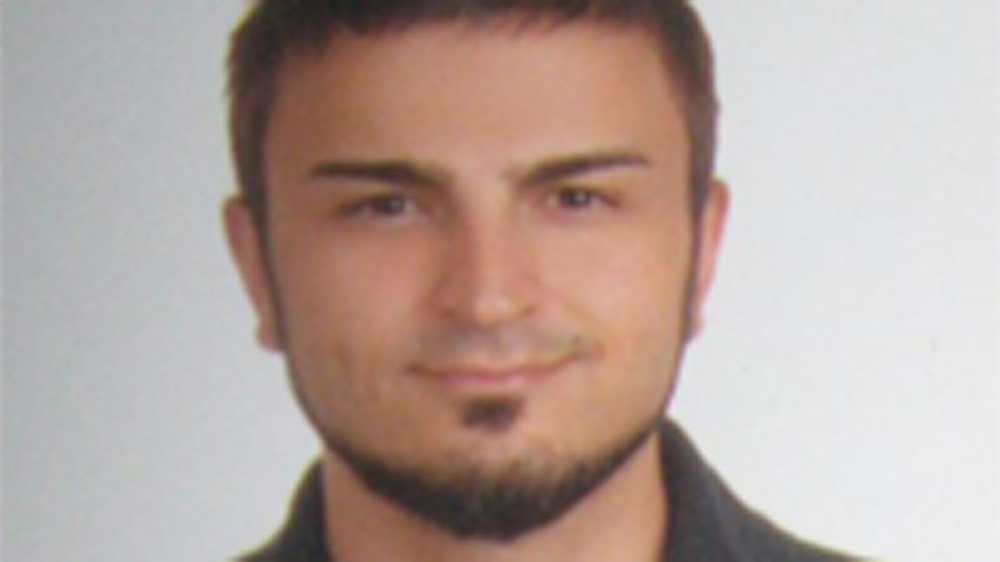Turkish president urges respect for AK party’s poll win
Recep Erdogan hails his party’s election victory as a vote for “unity and integrity” as observers raise concerns.

Turkish President Recep Tayyip Erdogan has hailed his party’s election victory as a vote for “unity and integrity” and demanded the world respect the result.
The ruling Justice and Development Party, or AK party, secured a stunning victory in Sunday’s snap parliamentary election, sweeping back into single-party rule only five months after losing it.
Keep reading
list of 4 itemsFull jury panel seated on third day of Trump’s New York hush-money trial
Jacob Zuma’s nine lives: How South Africa’s ex-president keeps coming back
A flash flood and a quiet sale highlight India’s Sikkim’s hydro problems
“The whole world must show respect. So far I haven’t seen such a maturity from the world,” Erdogan said in an apparent reference to Western media’s often critical coverage of AK party’s policies in the past few years.
With almost all of the ballots counted on Monday, Erdogan’s party won 49.4 percent of the vote – enough for a majority with 317 seats.
The main opposition CHP won about 25 percent of the vote (134 seats), while the nationalist MHP party secured almost 12 percent, 40 seats.
The pro- HDP party has claimed 10.8 percent to get 59 seats.

In a statement after his party’s win, Erdogan said the result “delivered an important message” to the outlawed Kurdistan Workers’ Party that “oppression and bloodshed cannot coexist with democracy.
“Our people clearly showed in the November 1 elections that they prefer action and development to controversy,” 61-year-old Erdogan said.
Voters “have given proof of their strong desire for the unity and integrity” of Turkey, he added.
Despite the result, the AK party failed to take the required number of seats needed to call a referendum on changing the constitution and increasing the powers of the president, which Erdogan has sought.
Security concerns
|
|
Then, the pro-Kurdish HDP party won seats in Turkey’s parliament for the first time, denying Erdogan’s party a majority.
Mustafa Akyol, a Turkish political analyst and columnist, said the AK party’s victory was partly explained by an upsurge in fighting with the PKK and bloody attacks.
“The escalating terrorist attacks and decline of the economy since July created a fear about political instability. And those who seek stability voted for the AK party, fearing that the coalition governments are bad for Turkey as it was in 1990s,” Akyol told Al Jazeera.
“Some of the HDP’s Kurdish votes went to the AK party, because some Kurds blame the PKK for the re-escalation of the armed conflict between the PKK and Turkish armed forces.
‘No rival or enemy’
Addressing jubilant AK party supporters in his hometown Konya, prime minister and party leader, Ahmet Davutoglu, said that all 78 million people of Turkey would be embraced, whether they voted for the party or not.
“We are here to plant seeds of love. There is no rival or enemy on this land. There is only affection,” he said.
| Al Jazeera”s Umut Uras in Istanbul |

The AK party’s absolute victory was even over the expectations of the party’s own senior team. However, the real challenge starts now. There is unprecedented social polarisation in the country, which is apparently why PM Davutoglu gave messages of love and unity as he spoke on Sunday. Amid the security crisis pushed by the PKK and alleged ISIL attacks, decreasing democratic standards and eroding economic stability, the country needs to ease tensions in Turkish society to focus on its real issues. The victor of the polls has a great chance and responsibility to put an end to the tensions among Turks and “make 78 millions stand shoulder to shoulder” as Davutoglu put it. |
“Nobody should get into a psychology of defeat. Our democracy has won,” Davutoglu added.
The polls were held amid instability spilling over to Turkey from neighbouring Syria and renewed tensions over the 30-year-old Kurdish conflict.
Three bomb attacks in recent months on political and activist rallies across Turkey, blamed on the Islamic State of Iraq and the Levant (ISIL), shocked the Turkish public, killing 139 people.
A bomb explosion in October at a peace rally in the capital, Ankara, killed 102 people. The violence marked the worst such attack in the country’s modern history.
Scores of Turkish soldiers have been killed in fighting since a ceasefire and talks between the sides broke down in July.
Amid this atmosphere, the currency of the state, the Turkish lira, has massively depreciated, threatening the stability of the economy.
RELATED: HDP – Party of Turkey’s oppressed?
After the results, there were reports of stone pelting outside the headquarters of the HDP party in the main Kurdish city of Diyarbakir. Police then fired tear gas to clear the area.
HDP leader Selahattin Demirtas was critical of the electoral process, saying it was not a “fair election” after his party halted campaigning in the wake of the ISIL attacks that targeted pro-Kurdish activists.
“But it’s still a big victory, we have lost one million votes but we have stood tall against this policy of massacres and fascism,” he said, vowing to press the faltering push for peace between Ankara and PKK rebels.
The AK party has been criticised in the recent years by Western governments, rights groups and Turkish opposition parties for cracking down on opposition protests and press freedom.
The White House said on Monday it was deeply concerned that media outlets and journalists were subject to pressure during the Turkish presidential campaign.
Amid reports that journalists were pressured in order to weaken political opposition, spokesman Josh Earnest said the White House has urged Turkish authorities to uphold the values of its constitution.
A left-leaning Turkish news magazine said on Monday its offices were raided by police and two editors detained over a cover suggesting election results would deepen divisions and trigger conflict in the country.
The latest edition of Nokta carried the cover headline: “The beginning of civil war.”
Additional reporting by Umut Uras @Um_Uras
![International election observers have noted that elections were free and peaceful but criticised media restrictions in the run-up to the vote [Burhan Ozbilici/Associated Press]](/wp-content/uploads/2015/11/f150943734714ed39570832c27ea4de2_18.jpeg)